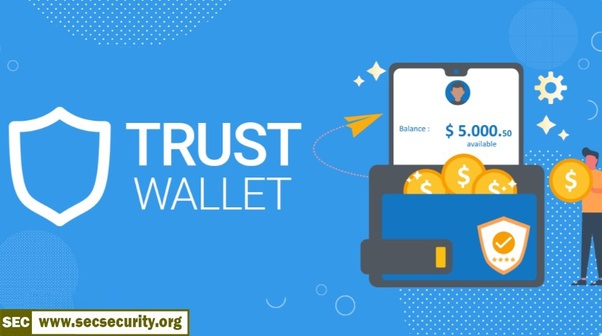Trust Wallet was founded in November 2017, making it over six years old as of 2024. It has since evolved to become a widely used mobile cryptocurrency wallet with a range of features for the crypto community.

Understanding the Evolution of Trust Wallet’s Features
The Initial Features of Trust Wallet
At its inception, Trust Wallet was focused on providing a basic yet secure platform for cryptocurrency storage and transactions.
- Ethereum Support: Initially, Trust Wallet was designed primarily for Ethereum and ERC-20 tokens.
- User-Friendly Interface: It emphasized an intuitive user interface suitable for beginners in the cryptocurrency space.
- Security Focus: From the start, Trust Wallet prioritized robust security features like key storage on the device itself.

Major Updates and Feature Expansions Over the Years
Trust Wallet has continually evolved, adding new features to enhance user experience and functionality.
- Support for Multiple Cryptocurrencies: Expanded to support Bitcoin, Litecoin, and other major cryptocurrencies.
- DApp Browser: Introduced an in-built DApp browser, enabling users to interact with decentralized applications directly from their wallet.
- Staking Capabilities: Added staking features, allowing users to earn rewards on their cryptocurrency holdings.
Trust Wallet’s Integration with Other Blockchain Networks
As the cryptocurrency landscape grew, Trust Wallet broadened its scope by integrating various blockchain networks.
- BEP-2 and BEP-20 Token Support: Integrated Binance Chain and Binance Smart Chain, increasing the range of available tokens.
- Cross-Chain Compatibility: Implemented features for seamless transactions and interactions across different blockchains.
- Integration with DeFi Platforms: Enhanced its features to include seamless access to various DeFi platforms, further diversifying its utility in the cryptocurrency ecosystem.
Trust Wallet’s Role in the Cryptocurrency Ecosystem
Trust Wallet’s Contribution to Crypto Wallet Technology
Trust Wallet has significantly impacted the development of cryptocurrency wallet technology.
- Innovation in Security: Trust Wallet has been at the forefront of integrating advanced security measures like encrypted key storage, which set a standard in the industry.
- User Interface Development: It has contributed to making cryptocurrency wallets more user-friendly, attracting a broader audience to the crypto space.
- Support for Multiple Assets: By enabling support for a diverse range of cryptocurrencies, Trust Wallet helped in promoting multi-asset management under one umbrella.
How Trust Wallet Influences User Experience in Crypto Management
Trust Wallet plays a pivotal role in shaping the user experience for crypto enthusiasts.
- Simplifying Crypto Transactions: Trust Wallet has made sending, receiving, and exchanging cryptocurrencies simpler and more intuitive for users of all levels.
- DApp Integration: The integration of a DApp browser within the wallet has streamlined the process of using decentralized applications, making them more accessible to the average user.
- Mobile-First Approach: As a mobile-first wallet, Trust Wallet has influenced the trend towards mobile-centric cryptocurrency management solutions.
Partnerships and Collaborations in the Crypto Industry
Trust Wallet’s strategic partnerships and collaborations have broadened its influence and capabilities in the cryptocurrency sector.
- Collaboration with Binance: Joining forces with Binance has expanded Trust Wallet’s reach and integrated it deeply into one of the world’s leading cryptocurrency ecosystems.
- Working with Blockchain Projects: Collaborations with various blockchain projects have enabled Trust Wallet to support a wide range of tokens and bring new features to its users.
- Community Engagement: Active engagement with the cryptocurrency community has helped Trust Wallet in aligning its development with user needs and industry trends.
The Technological Advances Behind Trust Wallet
Security Innovations in Trust Wallet
Trust Wallet has continuously evolved its security features to provide users with a safe cryptocurrency management experience.
- Encrypted Private Keys: Ensures that private keys are encrypted and stored locally on the user’s device, offering a strong layer of security.
- Secure Backup Options: Incorporates safe and secure methods for backing up wallet data, including the use of recovery phrases.
- Regular Security Updates: Continuously updates its software to address new threats and vulnerabilities in the crypto space.
User Interface and Usability Enhancements
The user interface and usability of Trust Wallet have seen significant enhancements, making it more accessible and user-friendly.
- Intuitive Design: Features a clean and intuitive design, making it easy for beginners to navigate and manage their digital assets.
- Multilingual Support: Offers support for multiple languages, broadening its accessibility to a global user base.
- Mobile-First Approach: As a mobile-focused wallet, Trust Wallet has optimized its interface for a seamless mobile user experience.

The Integration of Decentralized Finance (DeFi) Features
Trust Wallet has embraced the DeFi movement by integrating related features, making it a versatile tool for modern crypto users.
- DeFi Access: Provides users direct access to various DeFi platforms, enabling them to participate in yield farming, staking, and other DeFi activities.
- DApp Browser Integration: The in-app DApp browser allows users to interact with decentralized applications without leaving the wallet.
- Cross-Chain Compatibility: Supports features that facilitate DeFi interactions across multiple blockchain networks, enhancing its utility in the DeFi ecosystem.
These technological advances demonstrate Trust Wallet’s commitment to innovation, focusing on user security, ease of use, and staying abreast of the latest trends in the cryptocurrency and DeFi sectors.